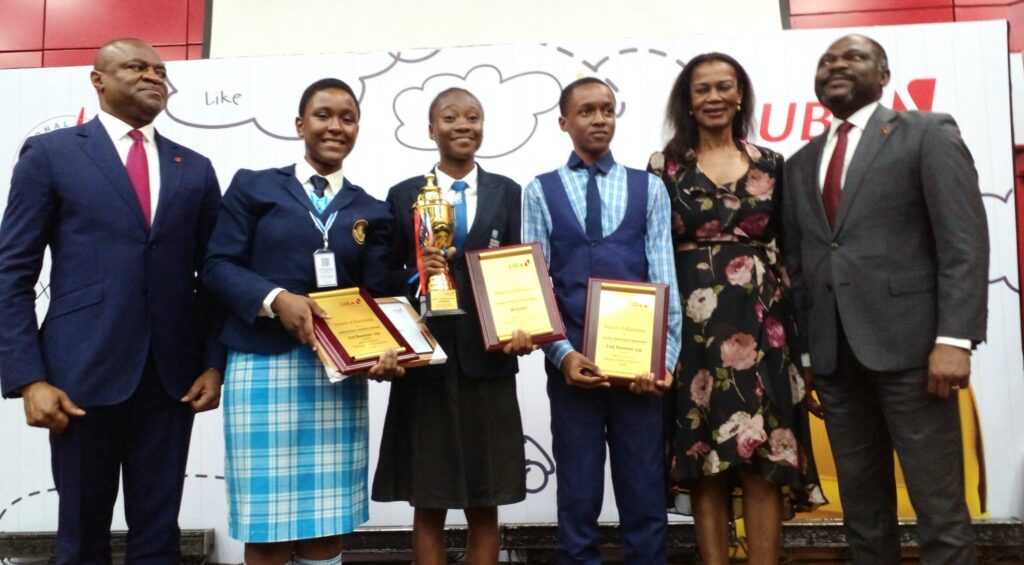By
A 16-year-old student of Everest Height International Academy, Gwagwalada, Abuja, Isimah Oluchukwu. has emerged winner of this year’s National Essay Competition organised by the United Bank for Africa (UBA) Plc among senior secondary school students nationwide.
She was announced the winner at the grand finale of the competition and award ceremony held at UBA House, Marina, Lagos, on Tuesday.
She is the sixth female student to win the star prize in six years even as fewer male students made the top 20 finalists invited to the award ceremony.
UBA National essay competition, which is an annual event and with this year’s edition, the 14th in the series, is one of the major UBA intervention initiatives on education domiciled under its social arm, UBA Foundation.
Oluchukwu, an SS3 student and fourth child of her parents defeated Christabel Obinna- Chukwu, a 15-year-old student of Regina Pacis College, Abuja and Greatness Emediong, a student of Nigerian Christian Institution, Akwa Ibom State, to second and third prizes, respectively and also 17 other finalists from among over 10,000 students who submitted entries nationwide.
While Oluchukwu was rewarded for her effort with a N7.5 million scholarship grant to study at any university of her choice in Africa, a trophy, laptop, certificate of merit, and a school bag, Christabel and Emediong on their part, won N5 million and N3.5 million scholarship grants respectively also to study at their choice universities in Africa and equally received a laptop, certificate of merit, and a school bag each.
Oluchukwu , who is aspiring to become a surgeon and was accompanied to the event by her mother, Mrs Comfort Isimah, told Nigerian Tribune that winning the competition was really tasking as she burnt night candles to read and research to put down the winning essay.
It was her first attempt to participate in the competition but she has been winning awards in the past in her school.
All the 20 finalists who scaled through the first two stages wrote on “Examine the causes, consequences and solutions of Japa Syndrome in Nigeria.”
While commending UBA Foundation for providing the platform, Oluchukwu said she had gained additional knowledge about contemporary issues in the country and that hard work and commitment are certainly rewarding.
In his remark at the event, the Managing Director/CEO of UBA Plc, Mr Oliver Alawuba, said UBA is particularly excited to be using the platform to boost education and reading culture and also encourage healthy competition among secondary school students in Nigeria and other African countries, noting that the annual event is designed to positively change the world.
According to him, we believe so much in quality education and we believe that the future of the world is in Africa and the future of Africa is in Nigeria.
He noted that the competition has produced so many winners with many of them now contributing meanigfully to the national development.
He promised that the bank through the competition would continue to support the education of Nigerians who want to study in any of the African universities.
Also speaking, MD/CEO, UBA Foundation, Bola Atta congratulated and commended the winners for their exceptional performance, urging those who did not win the major prize this year not to be discouraged but be more committed to enable them to do better in future.
She said the foundation had extended the competition to many other African countries where UBA operates including Gabon, Mozambique and so forth as a way of giving back to them.
Giving more insght into the competition, Atta explained that the best 75 were first shorlisted from the pool that made the second stage before the 20 finaists emerged with each of them was given N75,000 as reward to commemorate the 75th anniversary of the bank.
She, however, pointed out that the competition had really improved their wriiten prowess, confidence, critical thinking and also knowledge on social issues in their environment.
In her part, one of the panel of jurists, who assessed all the entries, Prof Ini Uko from University of Uyo, said many of the entries were actually poor as many students were not familiar with national issues around them let alone understand what they are about and also that some used slangs in their essays.
She said their entries showed that many of the students are too engrossed with social media and things that would not add value to them rather than be committed to their studies.









